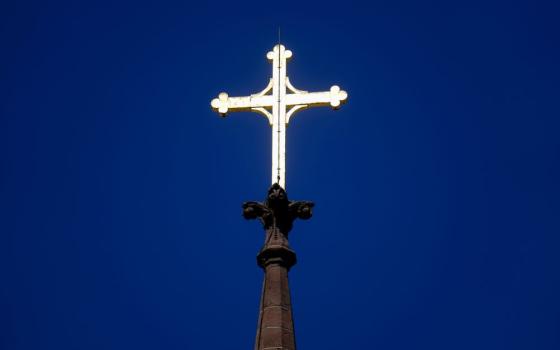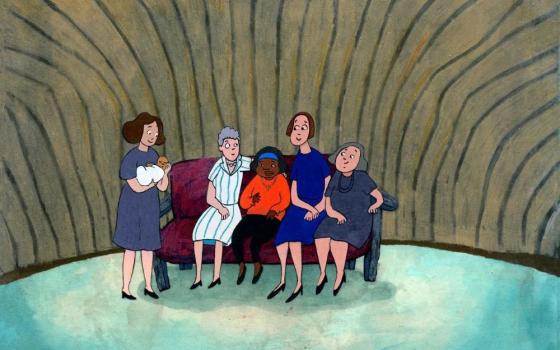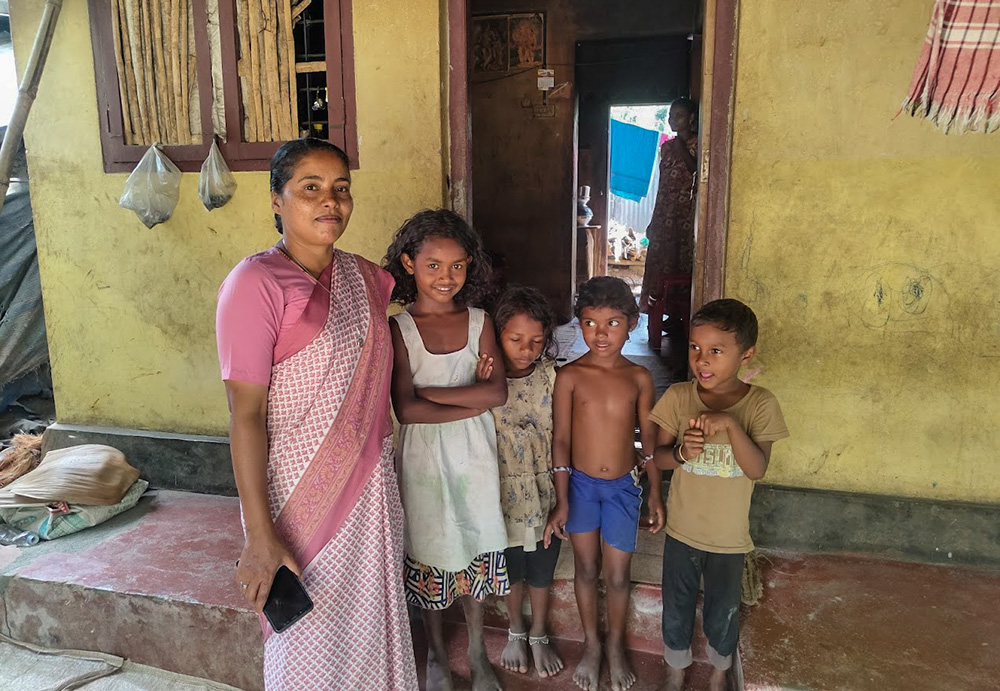
Charity Sr. Joicy Joy with children of Panthalam Unnati, an enclave in Kakkavayal, a village in the Wayanad district of Kerala, India. (George Kommattam)
Sr. Joicy Joy, a lawyer, provides free legal aid, mediates disputes and educates Indigenous tribes about their rights.
The member of the Sisters of Charity of Nazareth, a Kentucky-based congregation, also serves as a legal counselor with the Women & Child Development Department of the Kerala state government in southwest India.
Stationed at the Sisters of Charity convent at Kakkavayal, a village in Kerala's Wayanad district, the 42-year-old nun handles cases of domestic violence and family disputes for the department.
She is also a legal adviser for Neethi Vedhi (Forum for Justice), a nongovernmental organization defending the rights of marginalized groups. She shared with Global Sisters Report about her mission and challenges.
GSR: Why did you become a nun and a lawyer?
Joy: I saw a lot of ill treatment of the poor as I grew up in Vazhavatta [near Kakkavayal]. I wanted to become a lawyer so that I could fight for them in court.
I was also influenced by movies that show heroes fight for the poor.
But I was not so religious, nor did I feel a call to be a nun. However, this changed after I met the Sisters of Charity of Nazareth during my college days. They had opened their first convent in Kerala near my home. Their approach to life deeply attracted me, so I joined them in 1996, discontinuing my studies.
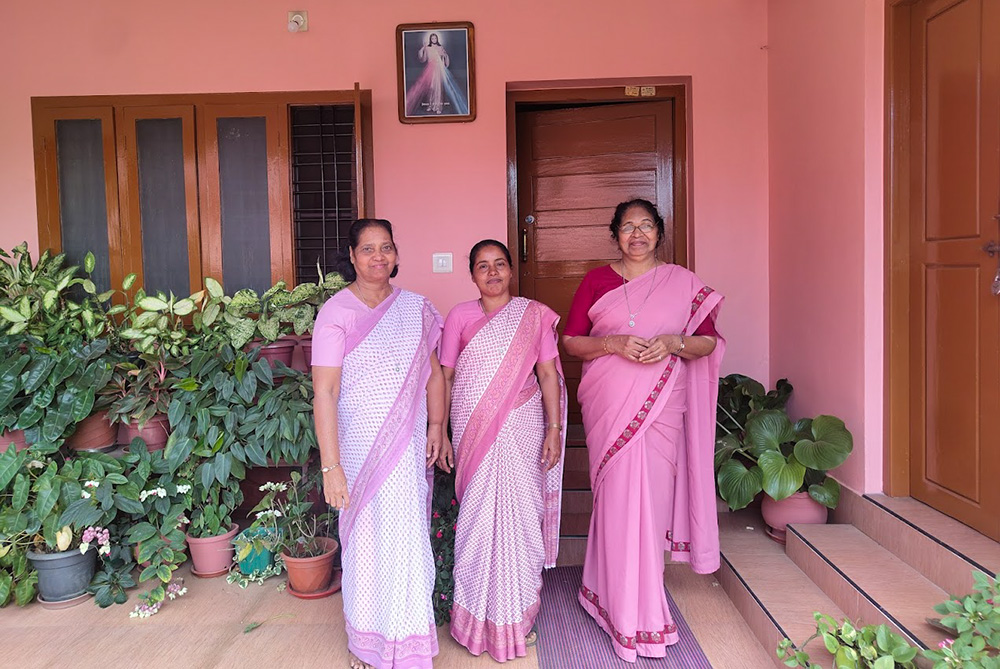
From left: Srs. Elsy Gregory Vettickal, Joicy Joy and Suma Chacko Muthukattuparambil in front of the convent of the Sisters of Charity of Nazareth in Kakkavayal, a village in the Wayanad district of Kerala, India. (George Kommattam)
My formation was at Mokama [in the eastern Indian state of Bihar]. During my training, I had opportunities to live among tribals. They were poor and exploited with no courage to speak up. Their plight further confirmed my decision to help the marginalized demand their rights.
After my final commitment in 2009, I was assigned to Mumbai [western India] where I worked in a slum with an NGO. I studied law while working in the slum.
Why did you return to Wayanad?
In 2014, I was assigned to work with Neethi Vedhi, with whom our congregation had a 10-year collaboration agreement.
As part of the NGO, I conduct awareness classes in villages, schools, panchayats [village councils] and share legal knowledge with women and the marginalized.
We offer free legal services to domestic violence victims. When necessary, I file cases for such women. I also try to reconcile them with their husbands.
My work is human rights-based and upholds the constitutional rights that treat everyone equal.
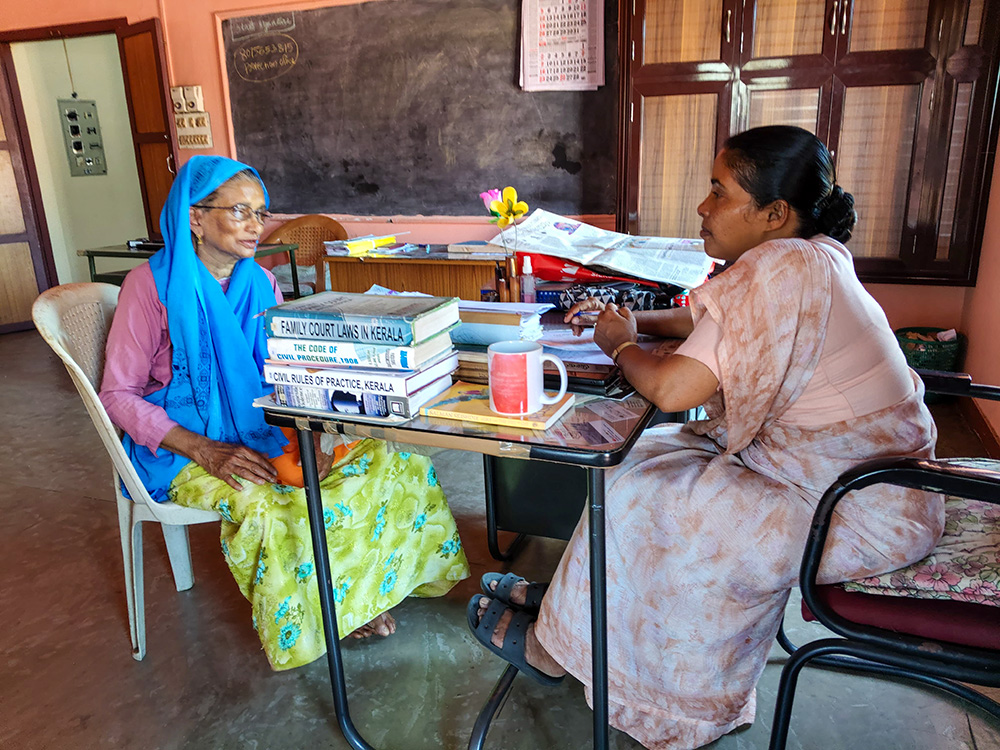
Charity Sr. Joicy Joy interacts with a Muslim woman in her office at Kakkavayal, a village in the Wayanad district of Kerala state in India. (Courtesy of Joicy Joy)
How has your experience been so far?
I never charge fees for service. In fact, I support the marginalized. Over the years, I have learned to become patient, empathetic and nonjudgmental. This helps clients approach me with their problems.
In 2018, I was appointed as a legal counselor at Neethi Vedhi, a government post that helps me handle domestic violence cases in panchayats and municipalities. It gives me the authority to engage with victims, respondents and families to ensure justice.
What are the problems tribal people face?
Tribal communities such as Paniya, Adiya and Kattunayaka were the original inhabitants of Wayanad. However, their land was taken by people who came to settle here in the early 20th century. The legal system sided with the settlers. Now, most tribal families are landless laborers.
Past experience along with ignorance and illiteracy make tribals distrust the legal system. Nor do they fight for their rights.
Alcohol is another problem, making them disinterested in changing their situation.
How do you address these problems?
We help tribals with land demarcate their boundaries and prevent encroachment by others.
We get them ration cards [that entitle them subsidized food and provisions]. Sometimes, they aren't paid fair wages. We mediate and resolve such issues.
Advertisement
We organize awareness classes for tribals to wean them away from alcohol and substance abuse. But it is not easy to make them give up the habit completely. So, we focus on the youth to prevent them from getting addicted.
Now, the tribals approach us for help, and we fight their cases in the court.
What else do you do?
I am the program coordinator for our congregation's outreach program called, "Prathiksha" [Hope]. I oversee our staff who assist women, children and tribals. Besides the legal support, our staff help the poor access government welfare projects.
The Prathiksha takes up cases where tribals are denied government benefits, treated unjustly by their employers.
Whenever an unjust treatment is reported, we take it up with the concerned authorities.
Health care and nutrition are other concerns among the tribals. The tribal villages have many bedridden and sick people. We collaborate with the government health department to get them proper care.
Our congregation has helped set up tuition centers in tribal hamlets to make their children interested in studies. We encourage them to attend school regularly.
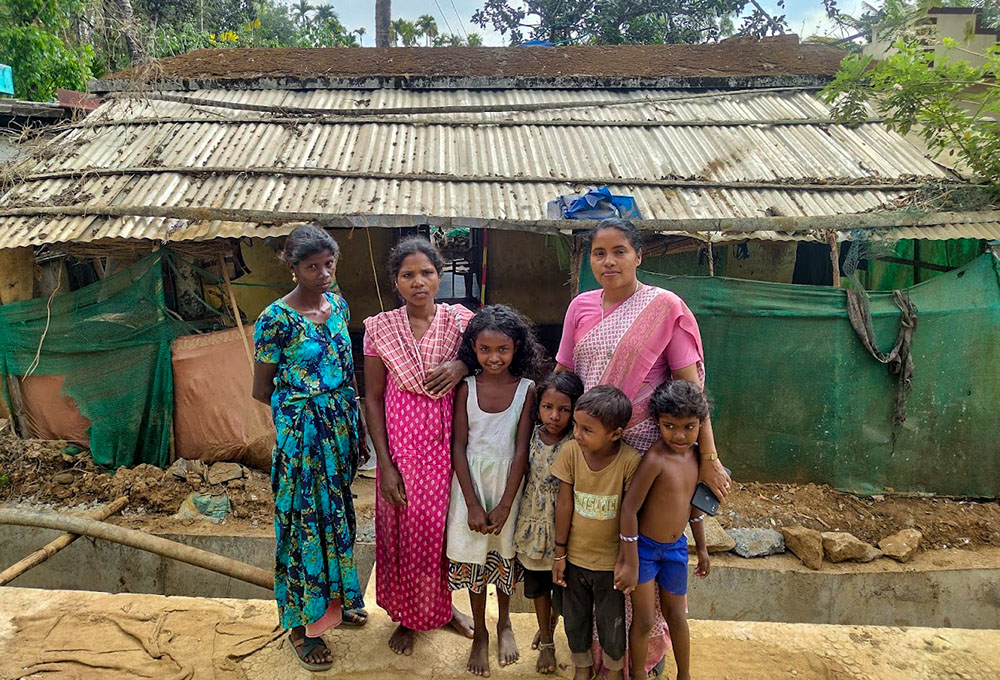
Charity Sr. Joicy Joy with children and women of Panthalam Unnati, an enclave at Kakkavayal, a village in the Wayanad district of Kerala, India. (George Kommattam)
We have built houses for poor families, migrants and the survivors of the 2024 landslides that devastated several villages in Wayanad.
How do you teach people about their rights?
Each year, the Prathiksha team conducts around 75 awareness sessions for an average 2,500 people in Wayanad.
The sessions are held in tribal villages or in educational institutions. People share their problems during the sessions. We help them approach government departments and courts with their problems.
We provide counseling to the victims of domestic violence and those [with] suicidal tendencies. Many family disputes are settled through mediation.
Please share some cases that have touched you.
[One] case is about Nani, a tribal woman. Her brother encroached her 20-cent land. Despite her attempts to mediate, the brother refused to return her share.
One of our staff intervened and held several discussions with the siblings. It was found that the land, ancestral property, had been divided among the siblings. Since Nani was not using the land, her brother started farming on it. After negotiations, he agreed to return the land. He also compensated Nani for using her land.
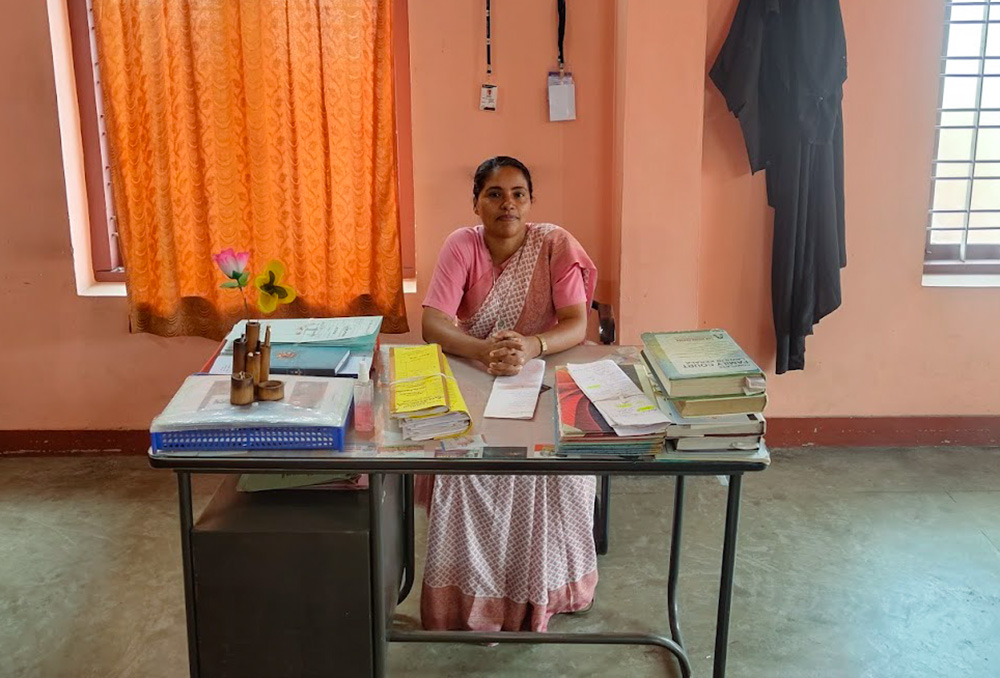
Charity Sr. Joicy Joy at her office in Kakkavayal, Wayanad, Kerala, southwestern India (George Kommattam)
I am told you and your team visit homes instead of working from the office. Why?
Many people, especially tribal communities, are reluctant to speak in office settings. They also don't like to travel far in search of justice. So, we go to them.
Visiting their homes makes them feel comfortable to share their problems. It also gives us a better picture of their problems.
How do you solve family and land disputes?
I tell them legal battles are long, costly and stressful and opt for amicable settlement through mediation. If necessary, I advise them how to handle court cases.
We have settled 99 of the 105 domestic violence cases we attended last year. Only six cases went to the court. We also handled 17 land and other disputes and 11 of them were settled.
What is the hardest part of your work?
Most clients do not understand the need for evidence in the legal process. They expect immediate solutions, and their lack of knowledge of law often leads to mistrust. Many had been cheated by outsiders in the past.
What are your future plans?
I plan to continue providing free legal aid to the poor and marginalized while working on updating my professional knowledge.




